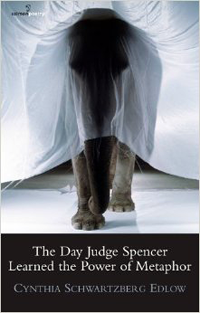by Winnie Khaw

The Day Judge Spencer Learned the Power of Metaphor
by Cynthia Schwartzberg Edlow
Poetry
Salmon Poetry
Pages 94
ISBN 9781907056963
Review of The Day Judge Spencer Learned the Power of Metaphor
by Winnie Khaw
About Winnie Khaw
Winnie Khaw aspires to create quality literary work, whether in poetry, creative nonfiction, or more questionably, fiction, and incidentally become astonishingly wealthy and adored by the world. Her work is featured in Magic Lantern Review, Empty Mirror Books, Passages North, Palooka Journal, The Philadelphia Review, Eclectica, The Daily Satire, etc. But mostly, Winnie spends her free time being silly...
From the opening poem the reader proceeds to unpack the morbidly entertaining contents of the “long, leathery, mottled man-luggage” (“Autopsy: Upon the Tamis Table”), a frightfully delicious description of a dead body about to autopsied by experts. Thankfully, Edlow’s actual work is lively and bright, evincing innovative humor and a keen imagination that blithely interrogates the essence of human behavior in reaction to everyday situations. Positive energy flows throughout the work on subjects ranging from a “naked attorney in the ladies’ room” to “ants.” The titles read like a whimsical shopping list for an imp on a holiday rampage, “When Academia Took Me to Lunch Then Fed Me the Bull,” “The Persimmon Can See You,” and many other entertaining headliners.
The eponymous poem “The Day Judge Spencer Learned the Power of Metaphor” is frequently food-spurting and startlingly comical. In it the “classically round, pointless” face of “lady attorney for plaintiff” is creatively compared to “the courthouse sink” whose “handwritten line[s] ris[e] ... flying like bats unstuck.” If Judge Spencer didn’t learn how excellently Edlow could apply poetic imagery and metaphor to page that day, this amused reader certainly did. Yet, even in this overall vivid piece there are lines that obscure instead of illuminate, bewilder instead of clarify, and tilt between sense and nonsense: out of context, “The feeling is soil but where to put his finger to it,” among others.
In another poem, “Skateland,” the 11-year-old speaker matter-of-factly relates that she was “pretty old” when she “got that [her] mother hadn’t taught her proper hygiene,” and then follows with a detailed account of her feelings when she comes upon naked boys. While this piece offers some light on the “weird aroused repulsion” the speaker experiences, the prose lines sound neither quite like a child nor an adult looking back to the time of childhood, but rather something oddly in-between and a bit unpolished. Other poems, as well, could have benefited from some pruning, not of image and metaphor, but of the language used in evocation of the above. That being said, in the bulk of the poems Edlow skillfully uses a prose-ish form that well offsets the quirkiness of her quick wit, words and ideas.
The celebration of the privilege of living, of life, is often well expressed even within usually mundane circumstances. However, many a poem wanders off into a sort of theme park which, though undoubtedly full of fun rides and amusements, gets lost in its own ingenious metaphor, as though confused as to which activity to do first and trying to do them all. The reader certainly experiences Edlow’s words with pleasure, a world, as Edlow says, is “permeated with a sense of wonder” to an admirable extent. However, seeming randomness in organization, even if intentional, and unevenness in lucidity, flow, and originality of lines, somewhat detracts from unadulterated enjoyment of The Day Judge Spencer Learned the Power of Metaphor.
Killing the ISIS Propaganda Machine, City of Ghosts
And Then by Donald Breckenridge
Magic City Gospel by Ashley M. Jones
One with the Tiger by Steven Church
The King of White Collar Boxing by David Lawrence
They Were Coming for Him by Berta Vias-Mahou
Verse for the Averse: a Review of Ben Lerner’s The Hatred of Poetry
Ghost/ Landscape by Kristina Marie Darling and John Gallaher
Enchantment Lake by Margi Preus
Diaboliques by Jules Barbey d’Aurevilly
Core of the Sun by Johanna Sinisalo
Maze of Blood by Marly Youmans
Tender the Maker by Christina Hutchkins
Conjuror by Holly Sullivan McClure
Someone's Trying To Find You by Marc Augé
The Four Corners of Palermo by Giuseppe Di Piazza
Now You Have Many Legs to Stand On by Ashley-Elizabeth Best
How To Be Drawn by Terrance Hayes
Watershed Days: Adventures (A Little Thorny and Familiar) in the Home Range by Thorpe Moeckel
Demigods on Speedway by Aurelie Sheehan
Teaching a Man to Unstick His Tail by Ralph Hamilton
Domenica Martinello: The Abject in the Interzones
Control Bird Alt Delete by Alexandria Peary
Twelve Clocks by Julie Sophia Paegle
Love You To a Pulp by C.S. DeWildt
Even Though I Don’t Miss You by Chelsea Martin
Revising The Storm by Geffrey Davis
Nature's Confession by J.L. Morin
Midnight in Siberia by David Greene
Strings Attached by Diane Decillis
Down from the Mountaintop: From Belief to Belonging by Joshua Dolezal
The New Testament by Jericho Brown
You Don't Know Me by James Nolan
Phoning Home: Essays by Jacob M. Appel
Words We Might One Day Say by Holly Karapetkova
The Americans by David Roderick
I Think I Am in Friends-Love With You by Yumi Sakugawa
box of blue horses by Lisa Graley
Review of Hilary Plum’s They Dragged Them Through the Streets
The Sleep of Reason by Morri Creech
American Neolithic by Terence Hawkins
The Hush before the Animals Attack by Carol Matos
Regina Derieva, In Memoriam by Frederick Smock
Review of The House Began to Pitch by Kelly Whiddon
Hill William by Scott McClanahan
The Bounteous World by Frederick Smock
Going Down by Chris Campanioni
Review of Empire in the Shade of a Grass Blade by Rob Cook
Review of The Figure of a Man Being Swallowed by a Fish
Review of Life Cycle Poems by Dena Rash Guzman
Review of Saint X by Kirk Nesset
Review of The Tide King by Jen Michalski
